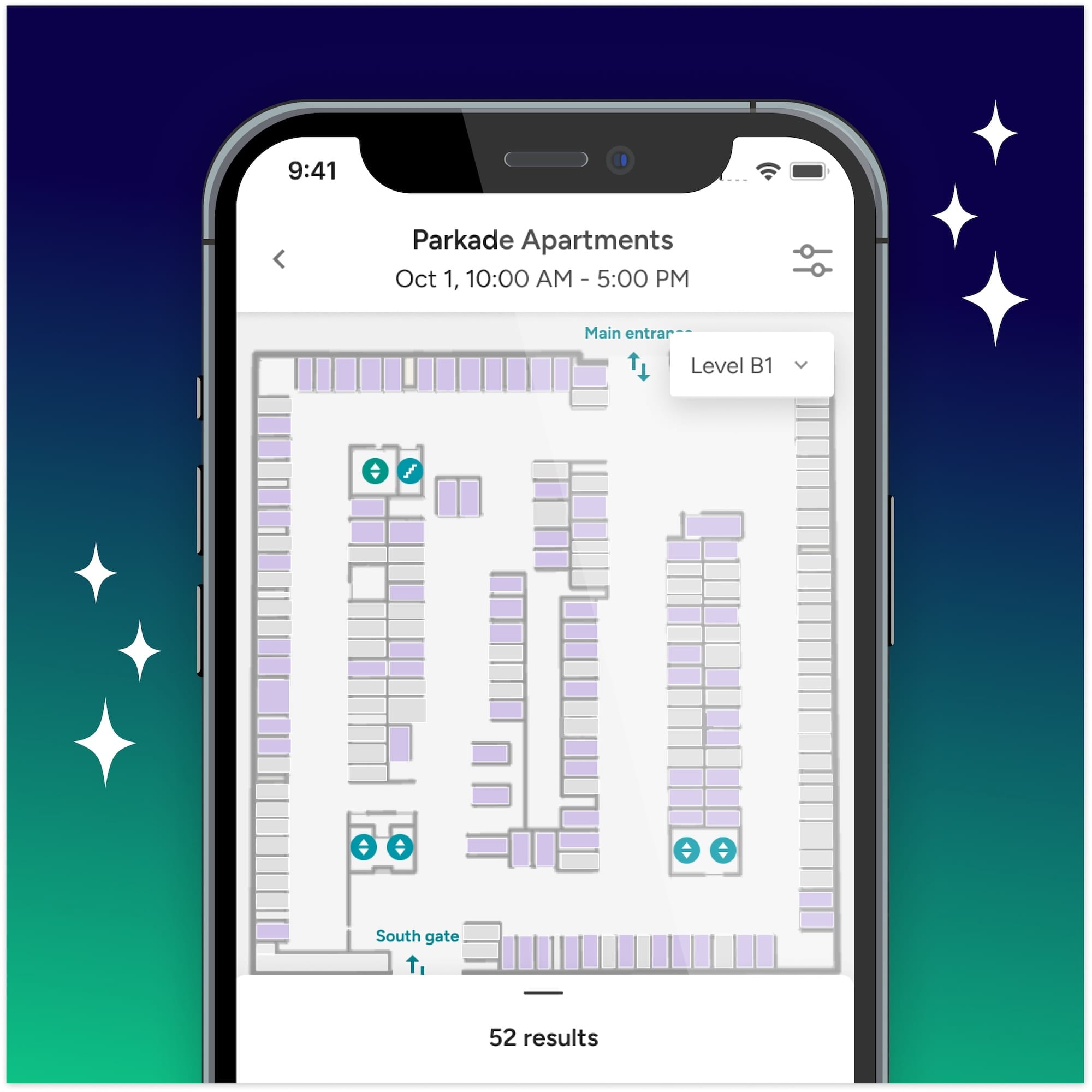

TABLE OF CONTENTS
When you’re considering revamping your parking lot, there are tons of decisions to make. Pricing, layout design, adding in special amenities and operational efficiency are important considerations.
But perhaps one of the most important questions to ask is, should you assign parking spots to your residents, or leave parking unassigned?
There’s no one-size-fits-all answer here, because what works for one property may not for the next. But there are some common indicators that point to the fact that assigned parking may be the right choice for you. Here are the top 4 reasons that you’re ready to make the switch.
Guest parking is often a necessity for your community. The ability to have friends and family come visit without worrying about where they’re going to park is a main deciding factor for many renters. In fact, 66% of renters in a recent survey said that dedicated guest parking was a top priority.
But sometimes, guest vehicles end up eating into the parking available for your actual residents, especially if your guest parking fills up. No resident wants to be left scrambling around the parking lot looking for a spot, especially after a long day at work. They love the peace of mind in knowing that they have a spot waiting for them when they get home.
Even when properties have dedicated guest spots, if the rest of the parking is unassigned, guests are likely to trickle into other unmarked spots if all of the guest spots are taken.
If you paint numbers on non-guest spots and make it clear that these are to be reserved for specific residents, guests are a lot less likely to park outside of the confines of the allowed areas.
Guest parking may be one pain point that you have with parking enforcement, but that’s not the only issue that could be solved with assigned parking.
One of the most common forms of unauthorized parking is residents sneaking extra cars onsite.
You may state in the lease that they’re only allowed a certain number of cars per household or bedroom, but if parking is unassigned, enforcing this is extremely difficult. You’d have to resort to manually walking around and checking for hang tags or decals, or license plates that aren’t registered.
With assigned parking, residents have clear places they’re allowed to park, making it not only easier to spot unauthorized cars, but also less likely that they’ll park anywhere they shouldn’t in the first place.
Some properties may also get a lot of nonresidents parking in their lots. Whether it’s because you’re in a bustling city center with limited or expensive parking, or you live right next to another apartment that has limited or strictly enforced parking so people trickle over to your lot, you may notice many spots being stolen from your residents.
People from both of these groups will see unassigned parking as a free alternative to paying for parking nearby. If you make it clear that all spots are assigned to certain people, these parkers will be a lot less likely to take up this valuable parking real estate for fear of being ticketed or towed.
From a psychological perspective, making it clear that this parking is assigned parking, you’re positioning the consequences of their actions on a more individual level. Someone may not care if they’re cheating an apartment complex out of a spot, but if they understand that they’re directly stealing a spot from an individual person, their guilt may make them think twice.
Not all spots are created equal.
One of the obvious differentiators is spots with EV chargers available. While only 4% of the population currently drives an electric vehicle, 55% are either seriously considering or may consider getting one, according to Gallup.
That means that spots with EV chargers or outlets are an increasingly hot commodity. 58% of EV owners even say that they’re willing to pay extra for an EV charger on-site.
With assigned parking, you can make sure that anyone with an EV has the option to reserve a spot with a charger so that they never have to worry about circling around the entire city looking for a free and functioning charger.
Other features that make spots more in demand than others include:
For example, the property below is a perfect candidate for assigned parking. It’s in a multi-level garage, and some spots are covered while others are uncovered on the top level. There are likely other differences between spots as well, such as compact spots, EV chargers, proximity to doors and elevators, etc.

All of these features make these spots more in-demand. Assigned parking not only gives your residents the option to reserve this special spot for themselves, but it also gives you the opportunity to charge a premium for these spots.
We’ve seen most of our clients increase their revenue by around 20% by being more intentional about pricing their parking, putting thousands of dollars in their pockets each month. One property even boosted profit by 159%!
And when you consider the cost of maintaining parking — one single gate can cost anywhere from $5,000 to $100,000 — this extra revenue can be really helpful to offset or even overpower those costs.
You know how they say “the customer is always right?” In multifamily properties, the resident is always right. At the very least, what they care about most should be a priority for management.
Studies have shown that many people prefer a dedicated parking spot, as opposed to open parking. In a study conducted by J Turner, 59% of respondents said that they would pay more of a dedicated spot — 46% saying a dedicated spot is worth paying $25 per month, and 13% saying they would pay $75 for a dedicated car port.
The underlying reason that assigned parking is so alluring to residents is the predictability. Without this predictability, your residents may become frustrated if there are times when they can’t find a spot. These frustrations may be expressed in the form of negative reviews for your community. And we don’t need to tell you how instrumental those reviews are in getting new leases signed.
At the end of the day, if your residents are demanding assigned parking, you should probably listen.
We mentioned earlier that assigned parking isn’t for everyone. So how do you know if you fall in that group?
Put simply, if you’re having no problems with running out of unassigned parking, you probably don’t need it.
Many properties have more than enough parking spaces for residents and guests alike due to a variety of factors like location, size of their lots, etc. In these cases, we wouldn’t recommend scrapping your current strategy.
If you try to fix something that isn’t broken, and more importantly, something that your residents are used to, it’s going to lead to wasted energy at best, or annoyed residents at worst.
Just like “premium” spots can make assigned parking an attractive option, a parking lot with spots that are more or less identical is a great indicator that you don’t need to assign parking.
Take the building below, for example. There is not much difference between any of the spots available in the parking lot.

If every space is around the same size, same distance from the units, all covered or uncovered, and have no differing access to amenities, residents likely won’t care where they park. This will make it unlikely that you can take advantage of differing pricing.
So if you have no shortage of parking or security/enforcement concerns, in combination with uniform spots, you should stick to unassigned parking.
Let’s say you’re ready to make the leap to assigned parking. But before you do that, consider how you’re going to handle enforcement. Do you have the current management processes or tools in place to do so?
We reached out to residents to share their experience. Here’s a cautionary tale about a property that didn’t do the right prep work:
"I lived in a 400+ unit apartment complex in the suburbs of Atlanta, meaning everyone had cars. Although the parking lot was big, it wasn’t quite big enough to accommodate all of the resident vehicles. I could always find a spot, but would sometimes have to walk all the way across a sprawling apartment complex, which can be up to a 5 minute walk.
So when they said that we were switching to assigned parking, I was excited. But that excitement quickly devolved into looking back fondly on the comparably better previous system.
There were 8 guest spots for the whole complex, so naturally, they filled up almost immediately. This led to a domino effect of people parking in each other’s spots, or having to park a mile down the road where street parking was available. Management refused to tow because there were just too many instances, so it became a free for all again pretty quickly."
Case in point: assigned parking will not always fix your process if not reliably enforced. In this scenario, had the property harnessed the right tools to streamline enforcement, they could have truly solved their parking shortage without sending all of their residents into a tailspin.
So what is the right tool to solve your enforcement issues?
Parkade is an end-to-end parking management system that can help you avoid the domino effect of someone parking in the wrong spot. On the app, residents are able to report the unauthorized parker, and they’re immediately redirected to an empty spot that they can park in.
At the same time, using the license plate, Parkade can instantly identify who the car belongs to. If it’s a fellow resident, they’re notified to move and can even be charged a fine if you opt to. If it’s an unknown car, at that point you can get a tow truck involved and Parkade will handle it from there.
This seamless enforcement not only gives your residents immediate resolution, but it also eliminates the need for your team to walk around and check for unauthorized cars, which can be one of the most time-consuming and trickiest parts of parking management.
Essentially, if you need to switch to assigned parking, Parkade eliminates all of the hassle, leading to a better experience for both you and your residents.
.jpg)
As parking management becomes increasingly digital, security becomes critical — and we’re excited to share that we've achieved a major security milestone.
Read Story
We’re thrilled to announce one of our most significant leaps forward this year: the launch of dynamic maps across our mobile and web applications.
Read Story
Now that AB 1317 is official, it’s time to brush up on the requirements and see how your properties stand to benefit.
Read Story